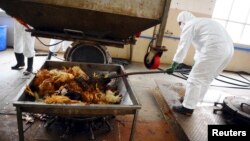BEIJING —
The World Health Organization representative in China says there is no sign that a new strain of bird flu is spreading easily from person to person. But authorities say much is still to be learned about the disease that has infected 87 and left 17 dead.
Chinese health officials say more than half of those who have been sickened by the H7N9 strain remember coming into direct contact with birds before getting sick. For the other infected victims, how they got the disease is less clear.
Michael O’Leary, the head of WHO’s office in China, says a group of 15 experts are on a weeklong mission to Beijing and Shanghai to learn more about the disease and how it is spreading. They will also be looking into several cases of the disease where it appeared to be passed from human to human without direct contact with birds.
“It's not unexpected that if a person is sick and maybe is receiving very close care from a very close contact that once in a while it will pass to the other person, but this is not the same as sustained human to human transmission,” O'Leary said.
O’Leary says three clusters of cases have been officially reported in China where such transmission appears to have happened. One is of a father and son who died. In the second case, a daughter caring for her sickened parent became infected as well. The third case involved a husband and wife, both of whom were sick with pneumonia, but only the wife has been confirmed as having H7N9.
Of the 87 cases that were reported as of Friday afternoon, 64 are being treated, six have been released from the hospital and 17 have died. The majority of the deaths have occurred in the eastern city Shanghai, but cases have been reported as far north as Beijing.
“That's a fairly high mortality rate particularly because several others are in critical condition," explained O'Leary. "But what we don't know is the size of the iceberg under this tip.”
The source of the virus and how it infects humans is still not known. Tens of thousands of birds have been tested, but only a small number have been found to be carrying the virus.
China’s health and agriculture officials have closed live poultry markets in a bid to keep the virus from spreading and began culling birds in some cases. Officials say the poultry industry has already suffered nearly $3 billion in loses as a result.
Chinese health officials say more than half of those who have been sickened by the H7N9 strain remember coming into direct contact with birds before getting sick. For the other infected victims, how they got the disease is less clear.
Michael O’Leary, the head of WHO’s office in China, says a group of 15 experts are on a weeklong mission to Beijing and Shanghai to learn more about the disease and how it is spreading. They will also be looking into several cases of the disease where it appeared to be passed from human to human without direct contact with birds.
“It's not unexpected that if a person is sick and maybe is receiving very close care from a very close contact that once in a while it will pass to the other person, but this is not the same as sustained human to human transmission,” O'Leary said.
O’Leary says three clusters of cases have been officially reported in China where such transmission appears to have happened. One is of a father and son who died. In the second case, a daughter caring for her sickened parent became infected as well. The third case involved a husband and wife, both of whom were sick with pneumonia, but only the wife has been confirmed as having H7N9.
Of the 87 cases that were reported as of Friday afternoon, 64 are being treated, six have been released from the hospital and 17 have died. The majority of the deaths have occurred in the eastern city Shanghai, but cases have been reported as far north as Beijing.
“That's a fairly high mortality rate particularly because several others are in critical condition," explained O'Leary. "But what we don't know is the size of the iceberg under this tip.”
The source of the virus and how it infects humans is still not known. Tens of thousands of birds have been tested, but only a small number have been found to be carrying the virus.
China’s health and agriculture officials have closed live poultry markets in a bid to keep the virus from spreading and began culling birds in some cases. Officials say the poultry industry has already suffered nearly $3 billion in loses as a result.





